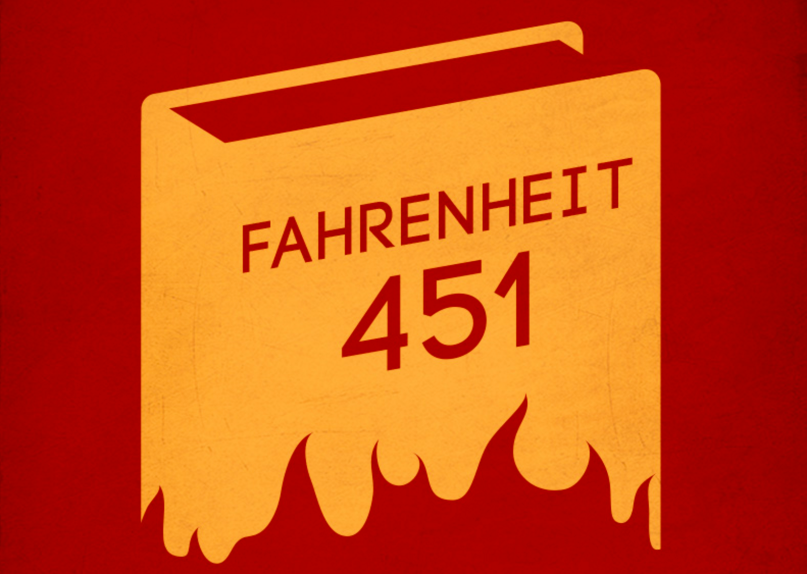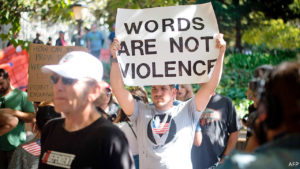What we’re seeing in today’s culture war is not government oppressing us and attacking free speech. We’re doing it to ourselves. That’s arguably much worse.
“Every record has been destroyed or falsified. Every book re-written, every picture has been repainted. Every statue and street building has been renamed. Every date has been altered and the process is continuing day by day. And minute by minute history has stopped.” — George Orwell, 1984
It’s perhaps the most famous passage, from the most famous dystopian novel, gifted to us from perhaps the most prescient author and rabid defender of free speech. And it’s also the passage that gets cited the most frequently, whenever free speech and thought are threatened by our nation’s self-appointed political correctness police, the ranks of which are swelling at an alarming rate.
Orwell’s 1984 was a warning about the perils of centralized control and the supremacy of the group over the individual, where morality, and truth itself, is determined by what is and is not good for the state, it being unquestioned, and unquestionable, that what is good for the government is good for the people. And so, Big Brother tells us, “war is peace, freedom is slavery, and ignorance is strength,” because “truth” is whatever serves the collective.
But, valuable though that lesson is, that’s not quite what we’re seeing today. At least, not yet. What’s confronting us is rather more pernicious. The government is not falsifying history. It’s not falsifying books. It’s not falsifying records. This isn’t a despotism, it’s a cultural civil war, a popular movement outside of government (for now), with the belligerents desirous of attacking anything that offends them, which — they being reflexively anti-Western Civilization while inconveniently living in Western Civilization — happens to be just about everything that characterizes our civilization, including the very concept of civilization itself.
This is not the world of 1984. This is Ray Bradbury’s Fahrenheit 451.
While ’84 is about government control, Fahrenheit’s thesis is that a scarier future exists where government control is not even necessary for censorship, because people demand it to avoid being offended. For those unfamiliar, in Fahrenheit, government “firemen” exist not to put out fires, but actually to start fires, to burn books and other artifacts, and thereby dispose of the real world in favor of a more comfortable and meaningless fiction. But the firemen know that they’re not even that necessary, because the public rejected anything that offended them in the first place. Fahrenheit argues that by dividing ourselves into small self-interest groups and victim groups along racial lines, ethnic lines, cultural lines, gender lines, religious lines, even professional and consumer lines, everything is necessarily offensive to somebody. Create enough groups and you can create enough offense, such that nothing is desirable except the most benign stimulation. As one of the firemen observes:
“Let’s take up [these small groups] in our civilization, shall we? The bigger the population, the more [small groups]. Don’t step on the toes of the dog lovers, the cat lovers, doctors, lawyers, merchants, chiefs, Mormons, Baptists, Unitarians, second-generation Chinese, Swedes, Italians, Germans, Texans, Brooklynites, Irishman, people from Oregon or Mexico. The people in this book, this play, this TV serial are not meant to represent any actual painters, cartographers, mechanics, anywhere. The bigger your market, the less you handle controversy, remember that!”
That’s what we’re seeing in America today: everybody dividing themselves into different groups, not conceptualizing themselves as an American (whatever that even means anymore), or, better yet, as an individual, but rather as a ranking member of this tribe or that, with its grievances and list of demands that must be met by everyone else, or else! And before you point the finger — Yes! Those people are just like that! — how many among us are truly without sin in this regard, at least to some extent?
And so it is that in Fahrenheit’s world, the public self-censored without government compulsion, and demanded the firemen, rather than have the firemen imposed on them: “It didn’t come from the government down. There was no dictum. There was no declaration, no censorship to start with. Technology, mass exploitation and pressures from these various groups carry the trick.”
That’s our reality. At some point, we stopped being individuals and organized ourselves into groups, and everything that does not affirm the group is a threat. Every group is therefore uncomfortable with something, and if you add up enough “somethings,” before long they amount to just about everything. Hardly anything isn’t offensive to someone, because nothing affirms everyone.
If that doesn’t describe our civilization (what’s left of it, anyway), then we are beyond description.
And no, this isn’t about attacking symbols of the Confederacy, which was a racist, anti-American organization that violated every human right imaginable and which does not deserve honor (though even that should be done democratically, rather than by mob). It’s about cancel culture in general, where everything and everyone not aligned with the neo-leftist worldview is under assault: U.S. Grant, Abraham Lincoln, Walt Whitman, Christopher Columbus, statues of Union soldiers, the Star-Spangled Banner, conservative speakers on campus, editors of the New York Times and Philadelphia Inquirer for not being sufficiently “woke,” images of Jesus that look too white, and anyone who thoughtfully argues in favor of standing for the national anthem, just to name a few. And above all else, the overarching theme, that any speech that doesn’t affirm one’s worldview is offensive and therefore “dangerous.”
So, with all respect to George Orwell and those who cite him as scripture, this isn’t 1984. That was the Soviet Union. What we’re facing in the United States isn’t government heavy-handedness, but rather a popular demand for censorship, in the name of protection, but really, repression. We don’t want anything that’s going to offend us, in any way whatsoever, and we’d be happy to give up our rights to speech, and truth, or, at least, demand that others do so.
And in a lot of ways, that’s even scarier, because it’s bad enough if a small number of people exert control over the rest of us. But it’s something much more worrisome that we’re doing it to ourselves, such that Fahrenheit’s future has become our present.




